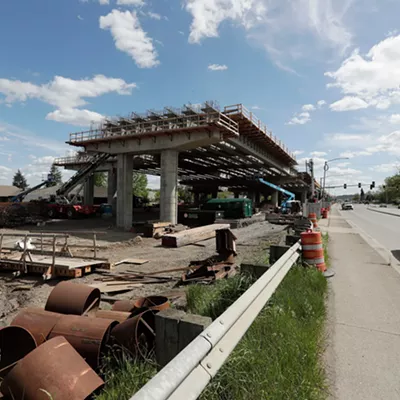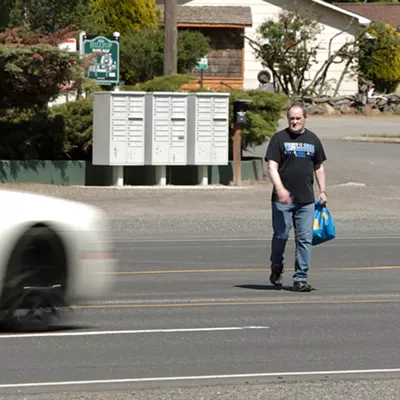His newest project, Home Ground, serves to address Americans' lack of basic knowledge about their own landscape. Rather than writing about place and community, as he has done so eloquently in essays and books like Arctic Dreams, Lopez served as editor for this project. The book is a compendium of terms describing the landscape and waterforms of North America, written by some of the pre-eminent literary lights of the American landscape, including Barbara Kingsolver, Charles Frazier, William Kittredge and Terry Tempest Williams. Home Ground discusses words found at the intersection of human culture and physical geography -- terms like "portage" and "outcrop," "windbreak" and "dry fall."
"It's the literary expression of what place means, what are the particulars of place," Lopez says of Home Ground. "Some people refer to the book as a dictionary, and I guess I've learned to accept that. But dictionaries have short entries with no personality behind the writers; I wanted to excite a sense of specificity about home places. Part of your sense of why you live there is in these terms."
The writers first reviewed standard definitions of their terms (20 per writer, generally), and then tracked down references in various works of American literature. Personal experience played a big role, of course, because Lopez asked writers to seek out the unrecorded aspects of landscape language, the kind of usage that only grows organically from interaction with the land.
"What people did to produce the book was mind-boggling," he says. "Each writer and [managing editor] Debra [Gwartney] would go back and forth, get an acceptable definition, then Debra would go back to the [advisory] board, and then back to writer. It was four years of work to bring these definitions to the page. They're so succinct that virtually every sentence had to be fact-checked."
An amazing group of 45 writers drawn from all across the country contributed definitions; other written works -- excerpts in which landscape terms enliven literature or poetry -- fill the margins, along with pen-and-ink illustrations by Molly O'Halloran. "What distinguishes American literature -- especially from European literature -- is this deep attachment to place," says Lopez. "And it's not just in the usual suspects, like Cather and Steinbeck and Melville and Thoreau; it's there in everybody's work. Truman Capote. Updike. One of the impetuses in choosing the marginalia was this sense of, 'Look at all these people and how they think about the landscape.'"
& lt;span class= "dropcap " & S & lt;/span & o how did we Americans get so disconnected from our land? Ironically, maybe Thomas Jefferson -- who envisioned "yeoman farmers" spreading democracy across the continent with plows and furrows -- is to blame for the state we're in. To spur western settlement, Jefferson imposed Enlightenment rationality on the raw and rugged American landscape with his Land Ordinance Survey, which gave us the rectilinear township-and-range system that overlays much of the western two-thirds of the continent. By turning the wildly diverse geography of North America into an abstraction of lines and squares, with no concession to topography, Jefferson's project may have unwittingly begun the process of separating Americans from the reality of the land.
In the introduction to Home Ground, Lopez writes: "It has become a commonplace observation about American culture that we are a people groping for a renewed sense of place and community, that we want to be more meaningfully committed, less isolated." Those two ideas -- place and community -- lie at the center of Home Ground. The end result is a book for people learning -- or relearning -- to live in relationship to the land, and to each other.
"The enthusiasm that [the writers] had for the book was so gratifying," says Lopez. "The point to me is: Thank God that all these people are brought together because there's something deep and moving about landscape. [This book] is like a WPA project -- it's the response of a group of writers and one artist coming together to define what the American character really is."
& lt;span class= "dropcap " & T & lt;/span & he naming of places can be an exercise in power, but the words in Home Ground are all terms that emerged organically. They are words with stories attached, names that reflect the lived experiences of people in a place. They are the words that transform a space into a place.
The names reveal the stories of human interaction with the land, often in deeply personal or intensely historical ways. Lopez tells the experience of Enrique Lamadrid, a collector of Spanish landscape terms in the Southwest and one of the project's advisors. In conversations with people who build small-scale irrigation ditches by hand in northern New Mexico, Lamadrid heard the Arabic word el azud used to describe a headgate. With one word, centuries of history unfolded for him -- the movement of Arab irrigation knowledge from North Africa to Spain; Spanish migration to the Americas; the relative isolation of the town.
"When you listen to language like that, you can hear the patterns of settlement," says Lopez. "You can begin to see that these terms are embedded in everyday conversation because of which European groups settled in which places."
One interesting aspect of the book, says Lopez, is that each entry is written personally, while remaining remarkably free of ego. While readers will glimpse each writer's imagination, the ego of a first-person voice is nowhere to be found. And that's just what Lopez wanted.
"When I think about what it means to be a writer, it means to be of service," says Lopez. "I have nothing bad to say about individual artistic vision, but I've always -- since my 20s, anyway -- been conscious of this idea that we don't really need you; we don't need your vision. What we need is clarity and evocation and excitement so that we citizens can say what we really need.
"Our job [as writers] is not to tell people what to think," he continues. "It's to help people who are thinking to frame their thoughts effectively. The measure of our value to society is to help citizens clarify their own thoughts, so that when they talk or vote, they say what they really mean."
Barry Lopez reads from Home Ground on Monday,
Sept. 25, at 7:30 pm at Auntie's Bookstore,
402 W. Main Ave. Free. Call 838-0206.
















